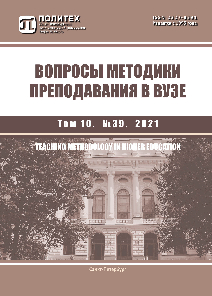TEACHING METHODOLOGY IN HIGHER EDUCATION 2(16) 2013
Year: 2013
Volume: 2
Issue: 16
Pages: 307
57
46566
Latest issues
- 2025, Volume 14 Issue 3
- 2025, Volume 14 Issue 2
- 2025, Volume 14 Issue 1
- 2024, Volume 13 Issue 4
Foreign language teachers' ICT competence
- 3
- 1263
- Pages: 91-104
Set Expressions as a source of country studies
- 0
- 1254
- Pages: 164-170
Teaching presentation skills within Business English course
- 1
- 1237
- Pages: 233-243



